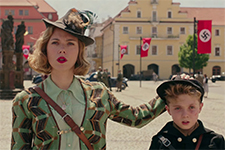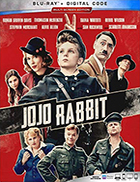Jojo Rabbit
|  It takes a special kind of daring to make a movie about a German adolescent coming of age during World War II whose imaginary friend is Adolf Hitler. And it takes a special kind of artistry to pull off such a movie and make it not just frequently hilarious, but genuinely moving and thoughtful at the same time. And that is precisely what writer/director Taika Waititi has done in Jojo Rabbit, which ventures into the fraught, darkly comic territory that chewed up and spit out Jerry Lewis (for his still largely unseen early ’70s Holocaust dramedy The Day the Clown Cried) and won Roberto Benigni a handful of Oscars (for his 1997 art-house hit Life is Beautiful). Waititi, a native of New Zealand who is half Maori and half Jewish, began his career with oddball comedies like Eagle vs. Shark (2007) and What We Do in the Shadows (2014). His big break came when Marvel tapped him to direct Thor: Ragnarok (2017), which was both a critical and a commercial hit. Waititi clearly chose to cash in all his chips at once and use all his newly earned leverage to convince a major studio to let him make Jojo Rabbit, which, lest you already forgot, features a sieg-heiling German cherub who dreams of becoming a Nazi soldier and has conversations with an imaginary Hitler. The titular Jojo, whose full name is Johannes Betzler, is played by newcomer Roman Griffin Davis, who has a round face, a snaggly front tooth, and a mop of curly blonde hair; he looks about has harmless as he actually is, which is central to the film’s humor. When we first meet him, he is determinedly dressing himself in his uniform as he prepares to go off to a weekend Hitler Youth Camp in the nearby woods. His imagery friend Adolf—who Waititi himself plays as a plucky, jingoistic cheerleader—paces behind him, giving him a pep talk and preparing him to be everything he can be for the Third Reich. The camp is run by the one-eyed, frequently drunken Captain Klenzendorf (Sam Rockwell), who clearly despises this particular assignment, and his righthand woman, Frauline Rahm (Rebel Wilson). It turns out, though, that Jojo is not destined to be a good Nazi, as he fails an important test at the youth camp, namely his willingness to mercilessly slaughter an innocent creature, in this case a rabbit (hence the mean-spirited nickname he is given, Jojo Rabbit). Jojo has a chubby, bespectacled best friend named Yorki (Archie Yates), who is as eager and ill-equipped to be a Nazi as he is, although nothing he does quite tops Jojo’s badly timed attempt to prove his mettle with a hand grenade. Back at home, Jojo lives with his free-spirited and optimistic mother, Rosie (Scarlett Johansson). Jojo’s older sister recently died of influenza, and his father hasn’t been heard from since he left to fight on the Italian Front. Rosie deals with the horrors around them by encouraging Jojo to be equally free-spirited and optimistic (there is a wonderful scene by a river in which she tells him that the first thing she will do when the war is over is dance because there is nothing more freeing than dance). At the same time, though, she steadfastly refuses to shield him from what is happening in their country, such as when Jojo tries to look away from a row of executed insurgents hanging from the gallows and she forcefully turns his head toward them. The majority of the narrative focuses on Jojo’s relationship with Elsa (Thomasin McKenzie), a Jewish teenager his mother is hiding in a crawl space behind the wall of his sister’s bedroom. For every bit that Jojo is naïve and misguided in his would-be Nazi zeal, Elsa is world-hardened and knowing, which makes for immediate conflict as Jojo is faced with the supposed monster that his national ideology would encourage him to destroy. Jojo, of course, is not a killer, and the film makes clear how absurd anti-Semitic rhetoric is when faced with the humanity it seeks to strip. Waititi is careful not to paint Elsa as a simplistic victim, but instead makes her a tough survivor who sees right through Jojo’s flimsy National Socialist armor to the scared kid who just wants to be accepted. Yet, she has to be careful because her life is essentially in Jojo’s hands, as he could rat her out at any time, and they make a pact that Jojo will not turn her in as long as she tells him her “Jew secrets.” She plays along by feeding him a constant stream of ridiculous myths about boogeyman Jewish powers, which he dutifully writes down in cartoon form in a book. One of the film’s best sequences—which marries suspense with humor in consistently surprising ways—finds Elsa having to pretend to be Jojo’s sister when a Gestapo unit makes a surprise inspection of their house. They are partially swayed by Jojo’s book of Jewish “horrors,” which points up in a darkly comic form just how ludicrous ethnic hatred can be. Despite being set in Germany against the backdrop of the Holocaust, Jojo Rabbit is clearly intended to be a movie that leaves you more hopeful than disillusioned, suggesting time and again that fundamental human decency will emerge in the most unlikely of places and vanquish even the most sustained of fascistic directives—a fundamentally different message than the one conveyed by Waititi’s source material, New Zealand writer Christine Leunens’s bleak sophomore novel Caging Skies. Messages of hope about fundamental human goodness are what we need right now, given that fascist rhetoric is re-entering the political mainstream; you can see why Waititi made the major changes that he did, especially jettisoning the novel’s second act that emphasizes, as Leigh Monson puts it in her comparison of the film and novel, “how people are doomed to fall victim to the harmful messaging that they internalize in their culture.” And, even if Jojo Rabbit isn’t a perfect delivery system—some of the humor is a bit too on-the-nose and cartoonish at times, such as when Jojo finally rejects fascist ideology by giving his imaginary Der Führer a kick to the balls in true Tex Avery fashion—it more often than not finds a clever middle ground between comedy and horror without completely giving in to either one.
Copyright © 2020 James Kendrick Thoughts? E-mail James Kendrick All images copyright © 20th Century Fox Home Entertainment | |||||||||||||||||||||||||||||
Overall Rating: 


 (3.5)
(3.5)


